If you are the leader of a social business or thrive launching one, and you consider entering the Austrian market, this article helps you understand the ecosystem of social enterprises in Austria. You might be an entrepreneur seeking solutions for social problems through business techniques and strategies. Or your organization may do business with the explicit aim to spend the profit on satisfying social needs. Whichever your intent may be, understanding Austria’s social traditions and ecosystem are essential.
This writing is mainly an excerpt and summary of the SOCIAL ENTERPRISES AND THEIR ECOSYSTEMS IN EUROPE Comparative Synthesis Report of The European Commission (2020) [1] describing the social enterprise landscape in Europe, and I am especially focusing on Austria [2] within. I have taken out the parts I find important for you if you’re considering to run a social business in Austria, and I complemented it with my own experiences and notes at the end. You can read and download the original full reports with research details here.
A new era of social ecosystems has emerged in the last decade: social businesses are born worldwide. Many start-ups and well-established organizations strive to solve social problems in a partly or completely self-sustaining way. Austria is part of the European Union, so let’s briefly examine the context and frameworks where Austria fits into.
Social enterprises in the EU
Country reports show that the numbers of social enterprises in Europe and the people they employ are increasing progressively in most EU member states. The demand for the services provided by social enterprises in Europe is growing, and the environment wherein social enterprises engage is progressively becoming more enabling.
Legal frameworks in the EU
The development of social enterprises does not necessarily require a specific legal form. Social enterprises can rely on existing legal frameworks. Some countries such as Austria have preferred not to introduce a specific legal form for social enterprises; still, a significant number of them operate in these countries, and the situation continues to develop.
In addition to, or instead of a public recognition system for social enterprises (no specific legal form), some countries like Austria employ a system of private marks, labels and certifications, that signal that a standard legal entity has a social aim. The reason behind the creation of private certification schemes is the concerned enterprises’ wish to signal their specificity as social businesses.
Operational excellence in the EU
Countries with extensive non-profit welfare structures have seen a shift of traditional non-profit organizations towards a stronger entrepreneurial stance (e.g., Austria). However, the potential of social enterprises is still far from being fully harnessed. There is significant room for improvement of the ecosystems in which social enterprises in Europe operate. Therefore a wide range of training and tools have emerged to address the lack of skills. Nevertheless, many programs tend to push social enterprises to mimic regular companies rather than to better exploit their competitive advantages vis-à-vis conventional enterprises.
Social enterprises in Austria
For social enterprises in Austria, stable economic development serves to create opportunities. Two new trends can be observed: the emergence of social businesses (entrepreneurs solving social or environmental problems) and the creation of community-led cooperatives.
The main drivers are voluntary engagement, Christian beliefs and values, and social workers as key initiating actors.
The emergence of social enterprises in Austria
The emergence of social enterprises has been influenced by political development; however, organizations in Austria play an important role in shaping societal life. They contribute to citizen participation and empowerment, and they enhance social cohesion, inclusion and job creation. The role of these organizations is twofold in Austria. On the one hand, they serve as “bottom-up” social initiatives, and on the other, as “top-down”-governed service providers (they execute the social jobs of the welfare state on behalf of the government).
During the Austrian socioeconomic development, four traditions of social-enterprise-related organizations have emerged:
- cooperatives,
- non-profit organizations (NPOs),
- collective social enterprises and
- social businesses.
Since the mid-1990s, the conservative welfare state model has gradually changed into a more liberal one. And this goes hand in hand with a marketization of the field. Social organizations have a higher level of responsibility to solve growing societal problems such as migration, demographic change and marginalization of rural communities through generating innovative services and finding alternative ways to finance them.
The legal form of social enterprises in Austria
There is no specific legal form for social enterprises in Austria. Those that exist—associations[3], public benefit limited liability companies[4], and cooperatives[5]—are defined to be social enterprises based on whether they correspond with the definition criteria[6] of being social.
Overall, the association legal form is the most common legal form among NPOs.
Small, community-led cooperatives often operate under the legal form of a cooperative. (In the category of larger cooperatives in the social housing sector, most organizations are also registered under the legal form of cooperative. However, there are several limited companies and some stock companies, too.)
The remaining organizations operate as public-benefit limited liability companies (or as limited liability companies without the public-benefit status or as limited liability companies governed by public confessional law.)
A minority of organizations function as foundations or sole proprietorships.
Activities of social enterprises in Austria
Community-led cooperatives are active in various fields, such as social care, community energy, sustainable consumer goods provision, housing, local services provision, culture, consulting, advocacy and education.
Larger cooperatives in the social housing sector, i.e. limited-profit housing organizations (gemeinnützige Wohnbauvereinigungen), are primarily engaged in constructing and managing housing. Secondary business activities refer, for instance, to the construction of housing for third parties, of commercial premises, of car parks or communal facilities for the general public.
Most non-profit organizations operate in social service activities: education, health, representation of interests, sports, arts and culture, research, ecology.
Given their core goal of work integration, ECO-WISEs (work integration social enterprise[7]) deliver a social service. However, WISEs also operate in different business fields to sell their service and products: household-related services, re-use and recycling, nature protection, food services, counselling in ecological concerns.
Regarding social businesses, younger organizations, and well-established, larger enterprises operate mainly in the fields of science and education, environment, and social inclusion or social services.
Resources and finance providers of social enterprises in Austria
Resources
Social enterprises in Austria rely on a mix of resource derived from
- public authorities (subsidies),
- sales of service to public authorities (public contracts),
- sales to private customers (sales of goods and services),
- membership fees,
- donations/sponsoring and
- other private revenue (for example, EU funds).
The trend is towards changing and insecure financing situations depending on the economic, social and political climates. Since few alternative financing channels exist, businesses often reinvest surpluses to support their social aims or accumulate reserves to avoid credit dependency on the mainstream banking system.
1.Figure: Resources of social enterprises in Austria[8]
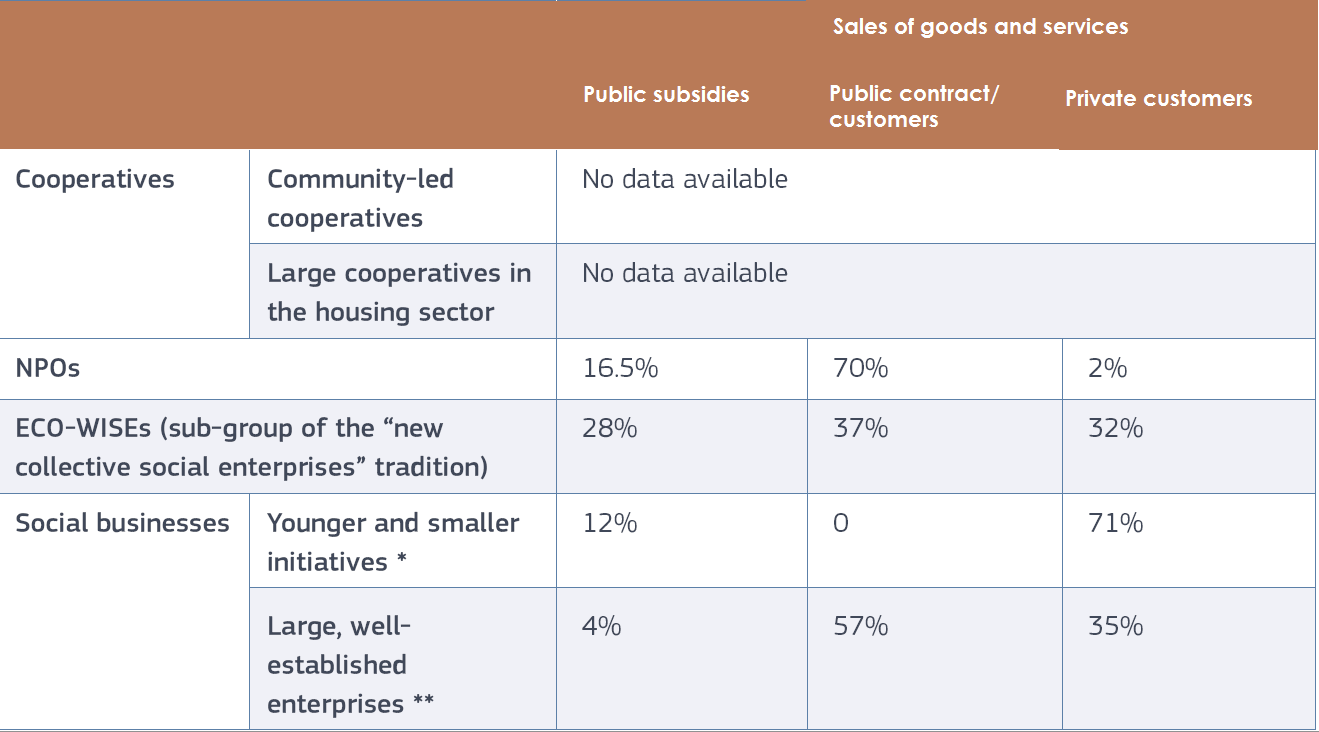
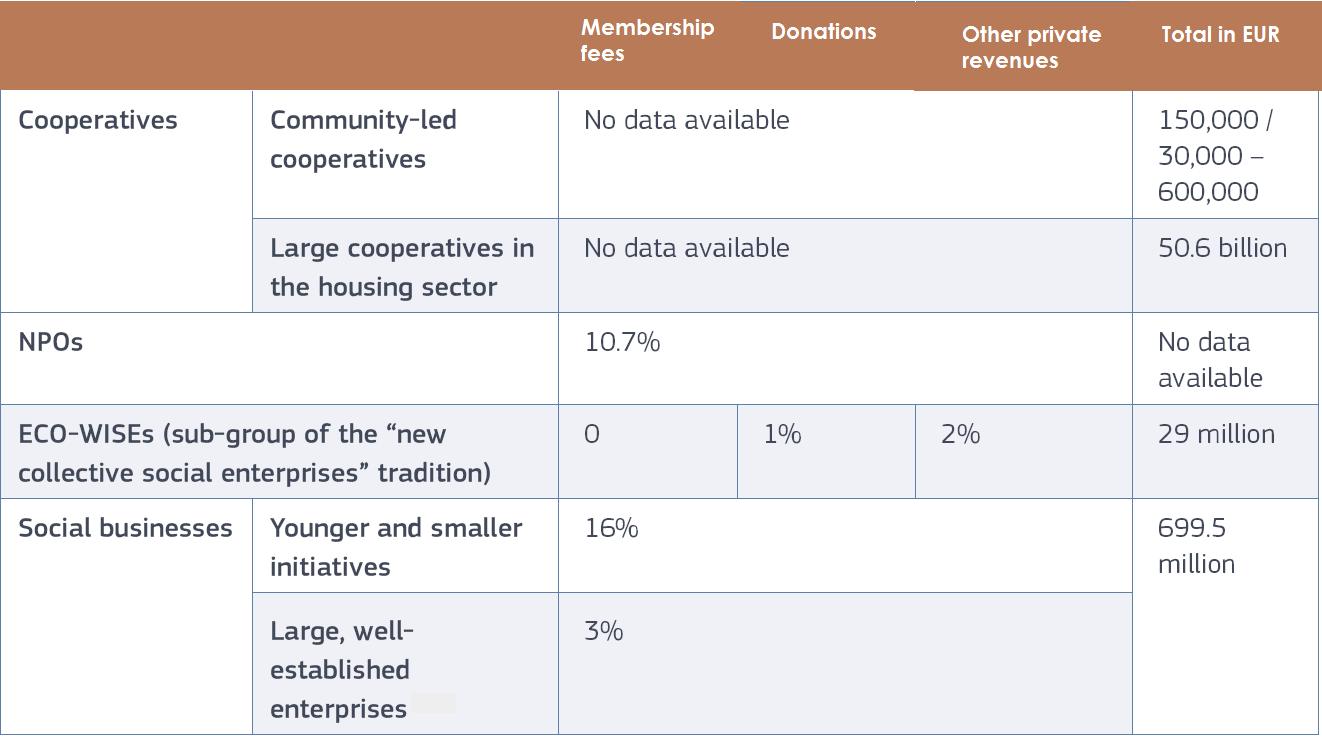
.
Data above show that younger, smaller social businesses have the following resource mix: 12% public subsidies, 0% from sales of goods and services for public institutions (no government contracts), 71% selling for private customers, 16% member fees, donations and other private resources.
Larger, well-established enterprises have it different: 4% public subsidies, 57% from sales of goods and services for public institutions (government contracts), 35% selling for private customers, 3% member fees, donations and other private resources.
So, in addition to public funding, income generation via public contracts or sales to private customers is an important income source.
Furthermore, there exist basic fiscal advantages and labor cost subsidies from which social enterprises can benefit.
2.Figure: Main fiscal benefits for social enterprises in Austria within the EU[9]
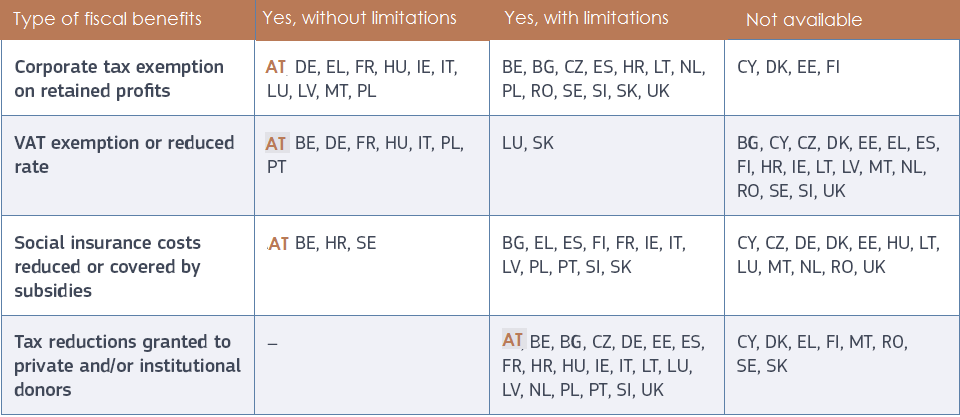
Finance providers
Few finance providers are specially tailored to fit the needs of social enterprises in Austria. The main finance suppliers to social enterprises are associated with Sinnstifter, an association to support public benefit initiatives. Twelve foundations belong to Sinnstifter, including two nationwide and internationally operating “big players”, Essl Foundation and Erste Foundation. It is rather exceptional that foundations finance the running costs of social enterprises in Austria. Nevertheless, they have recently provided seed and venture capital to social enterprises. Social enterprises also use dedicated funds (like those of Bonventure), which specifically target their activities.
Austria additionally considers crowdfunding as an opportunity, especially since no ethical banks currently operate in Austria. Besides the mainstream banks, which generally do not have specific schemes for financing social enterprises, three initiatives do exist:
- The Erste Group, which operates as an intermediary since 2016 for the EaSI[10] guarantee,
- HERMES-Österreich (an association that has financed social and ecological projects for around 30 years) and
- the Bank für Gemeinwohl (“the Bank for the Common Good” under establishment in Austria).
Finally, a pilot project on Social Impact Bonds is currently in process.
As you see, the social investment market (financing social enterprises) is very fragmented in Austria. This makes it difficult for social enterprises to orient themselves among the various financial sources, knowing that each financial provider will have its language and expectations about social enterprises. Simultaneously, social finance providers also find it hard to identify social enterprises meeting their specific investment requirements. There is a gap in the bilateral expectations.
Policy schemes and support measures for social enterprises in Austria
There is no specific policy scheme for social enterprises in Austria. In the following, you will see the support structures for all enterprises that fulfil specific criteria.
Additionally to labor cost subsidies, here you find different subsidies eligible for enterprises employing specific labor market-disadvantaged groups.
- Senior citizens have been defined as one particular group of disadvantaged workers because their unemployment rate has increased in recent years, so two programs have been established for the elder unemployed: Employment Initiative 50+ (“Beschäftigungsinitiative 50+”) and Action 20.000 (“Aktion 20.000”).
- Also, there are two business start-up programs in Austria supporting enterprises in general (AWS) or addressing specifically unemployed (UGP).
AWS (Austria Wirtschaftsservice) aims to promote businesses, provide a wide range of financial tools (loans, guarantees, equity, grants) and advisory services at all stages of business development, from their founding to their expansion on the international level. It offers support to enterprises in general, and social enterprises are not excluded from access to these tools. In fact, AWS established a grant scheme especially targeting social enterprises, called “AWS Social Business Call”.
UGP (Unternehmengründungs Program) is an existing programme implemented by the AMS (Arbeitsmarkt Service) to support participants in their efforts to become self-employed. This programme is meant for unemployed citizens who have a concrete business idea and appropriate qualifications.
Support measures specific to social enterprises mainly address WISEs. They employ hard-to-place unemployed workers, such as the long-term unemployed, disabled workers or senior citizens. The integration of these vulnerable groups in the labor market is regarded as a public task and is part of the Active Austrian labor market policy.
Paid workers vs volunteers at social enterprises in Austria
Approximately 16,800 paid employees are working in social businesses in 190 organizations. On average, large, well-established enterprises employ 144 persons and 52 volunteers. Younger and smaller organizations employ between 2 – 4 persons and between 2-4 volunteers[11].
Paid work is important in Austrian social enterprises, although voluntary work plays an important role as well. Volunteering is especially typical among smaller community-led cooperatives and in social enterprises stemming from the non-profit sector.
The ecosystem of social enterprises in Austria
The ecosystem for social enterprises in Austria include
- national and local policymakers,
- organizations promoting and recognizing social enterprises’ activities,
- research and education as well as exchange platforms and
- financial intermediaries.
In addition, social enterprise networks constitute an important category of actors due to their self-promoting role and advocacy function.
Approximately 1,500 organizations could be identified as social enterprises in Austria, including associations, cooperatives and public benefit limited liability companies. They are an important and growing sector of the economy. Especially in times of increasing social problems, such as migration, demographical changes, and welfare-state reforms currently undertaken by the government, social enterprises’ contribution is expected to become more important. They should initiate innovative and demand-oriented services and find ways to sustain them. However, they are confronted with constraining factors such as limited socio-political support, short-term instead of long-term funding; legal and fiscal uncertainties; limited recognition; and no common understanding of social enterprises, determining their visibility.
The relation of social enterprises with public authorities
The introduction of the public procurement framework in 2002 has continuously led to a shift from a subsidy culture towards public contracting. And that has changed the relation of social enterprises with public authorities. Public funding has become more restrictive and controlled. Furthermore, more restrictive handling of the funding directives for WISEs is observable in Austria. Through public contracting (Leistungsverträge), the organizations started to agree on given criteria, namely the type, quantity and costs of the services provided.
While the above strategies intended to create competition among social enterprises, a significant state intervention occurs in the limited-profit housing sector (gemeinnütziger Wohnbau). About 90% of projects by limited-profit housing associations receive public funding, mainly in object-specific subsidies for housing construction and refurbishment.
Network of social enterprises in Austria
Austria does not have a comprehensive network representing all social enterprises. There is one network representing the interests of WISEs: “Arbeit plus” with its regional networks. Sozialwirtschaft Österreich represents social and health service providers, and IGO advocates NPOs in general. DABEI Austria is an umbrella organization for enterprises working with citizens with disabilities.
Further, a networking platform represents organizations such as NPOs, gGmbH and foundations (Verband für gemeinnütziges Stiften); a multi-stakeholder network called GEMSE, and there are networks of Austrian cooperatives.
For newer forms of social enterprises, a few community-building initiatives and exchange platforms do exist, some of them at a regional level (Social city Wien, Emersense), some at a global level (Impact Hub Vienna, Ashoka, Architects of the Future).
Events (Social Business Day), prizes (Essl Prize) and awards (Sozial Marie, Trigos, Sustainable Entrepreneurship Award) are also qualified to represent the interests of social enterprises not only through providing networking and/or financial support but also by increasing their visibility to the public.
Nevertheless, even if the ecosystem seems well developed, it still remains fragmented.
3.Figure: Key actors in the fragmented Austrian ecosystem[12]
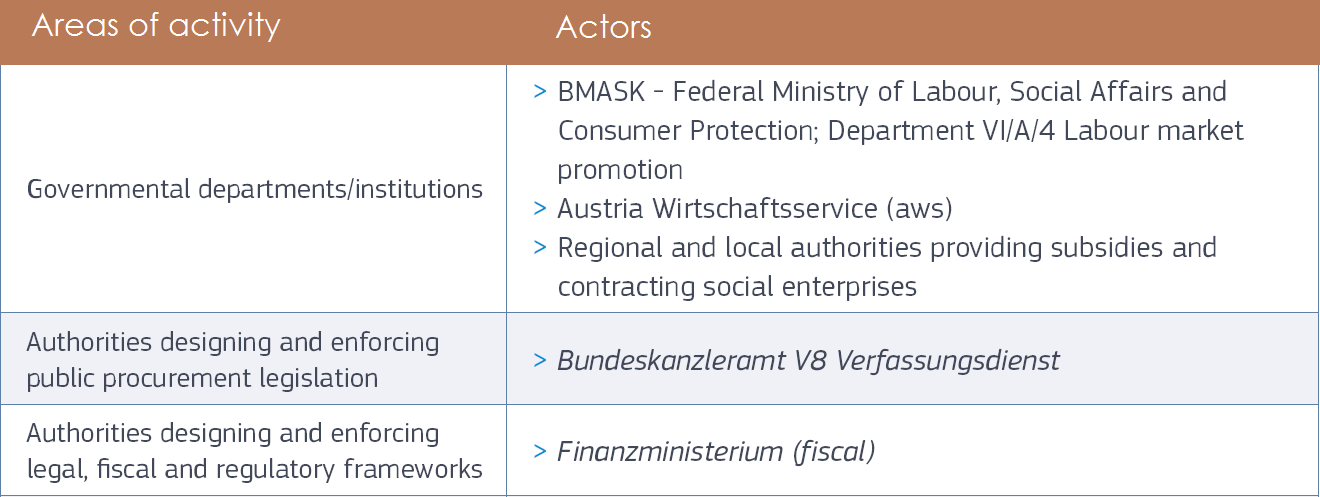
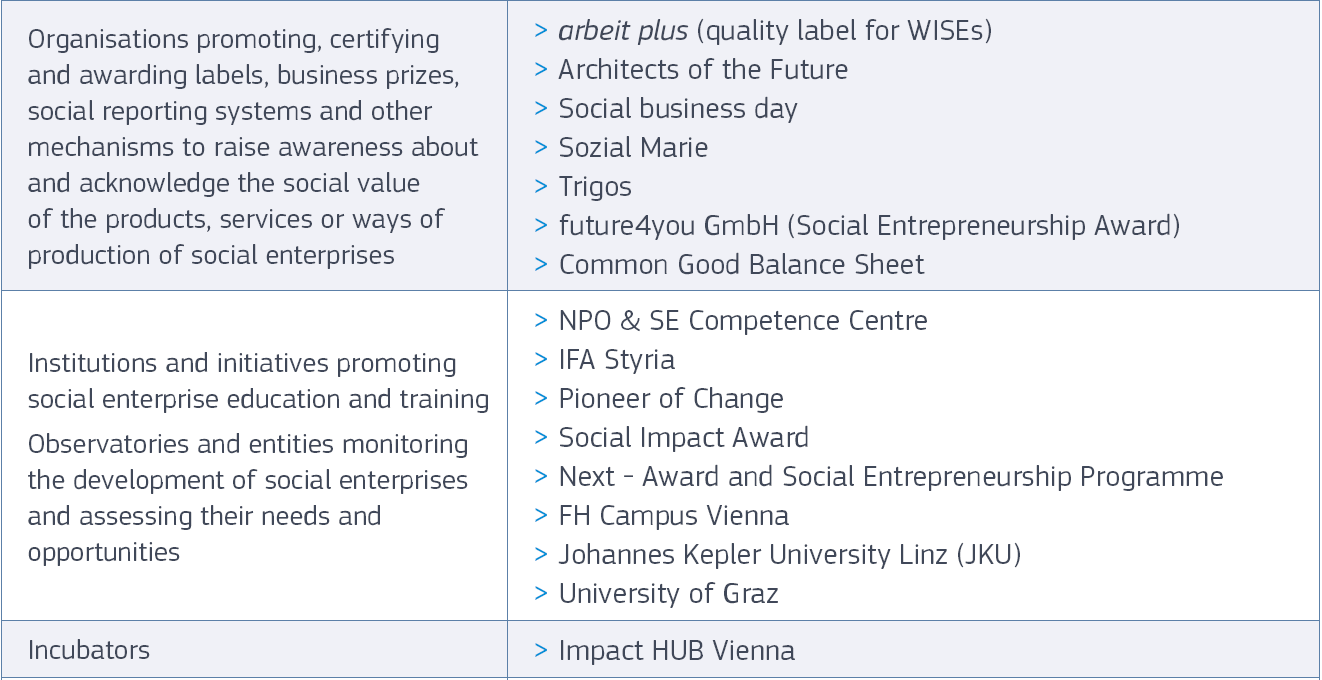

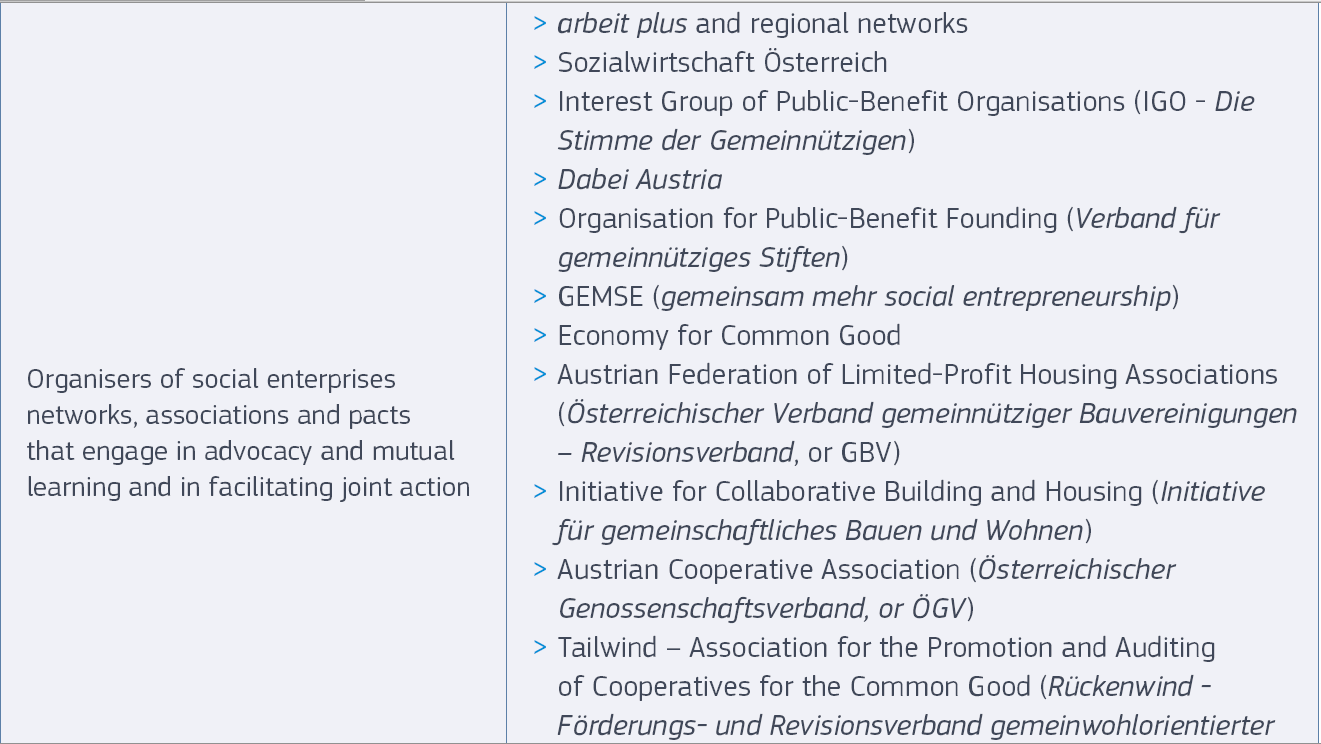
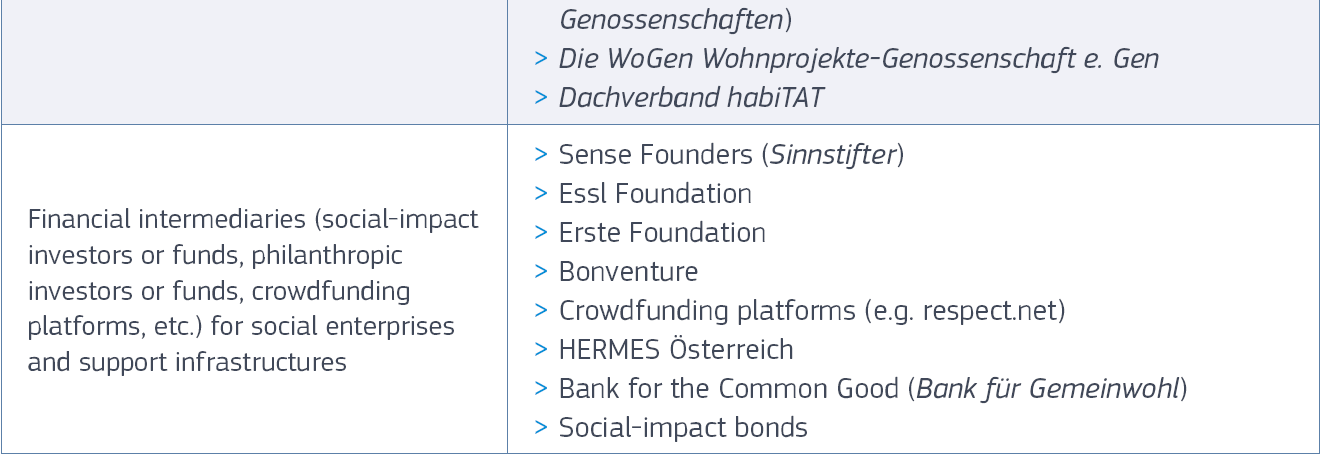
.
Your opportunities
Suppose you consider starting a social business in Austria and think in terms of a small/medium organization. In that case, it is usually inevitable to establish an Austrian legal entity to get funded by any institution in Austria. Another option is to join your forces with Austrian legal entities and apply as an international consortium, especially for EU funded projects. (Note: although I provided you with ideas and the Austrian conventionalities, this is not legal advice, it is necessary to consult with a legal professional.)
This article aims to help you understand the Austrian social market to think about your individual options.
In general, I see opportunities if you understand finance providers’ motivation in Austria, so you offer a relevant social concept for them. There is a huge gap between finance providers’ expectations and social organizations in Austria, and definitely, room to move. Especially private foundations are keen on having project ideas with sustainable business models. Here is why.
Austria is a country with a strong social net, having a high sensitivity to social problems. Even if you look at billboards on the streets, listen to or watch advertisements (radio/TV etc.), you will see many ads for social projects, programs and organizations. That is an integral part of society. There is a huge competition for donations, so it might discourage you, but
if you are able to build a sustainable social business model, Austria is a good place to go, because you stand out from the crowd and make a difference.
The explanation lies in history. As a welfare state, Austria used to distribute a lot of money traditionally for social purposes, and it is recently that the state started to check the efficiency of that money spent. Many social service providers have not yet found more efficient processes, so they feel the new circumstances block them from providing high quality, innovative solutions. It needs time until a robust system adjusts to new circumstances, and this is your chance to come up with a new type of business model, a more efficient or even self-sustainable one. The state is typically contracting big organizations for social services, trying to force them to modernize themselves, but private funds are open for the “new generation” of young social start-ups.
For this “new generation” of organizations, market-income generation is seen as necessary and valuable and more sustainable than public subsidies.
Your unfair advantages
Other than the business model, your unfair advantage is the way of implementation (i.e. service quality), as your long term key success factor. I have quite a lot of experience with subsidized social services in Austria (both as a service provider and a customer), and I think that most of the programs have a good concept. However, implementation is often weak, because services are not standardized and controlled efficiently. What happens is: the program concept is written professionally, approved by authorities; subsidy is granted; then the implementation is poor. And the control is basically self-control, which can be manipulated to claim further subsidy.
I have had good and bad experiences both, and the difference laid in control. In the case of my good customer experiences, the programs have been controlled by office-clerks one level above the implementer. Old cliché: only consequently measuring the outcome leads to improvement.
So here is your chance: have a partly or fully self-sustainable business model; work out your service details and standardize your processes almost like McDonald’s does; publicly measure efficiency and customer experience; adjust and improve your business permanently. Incremental self-improvement is a long term investment. Easily said, exhausting to do consequently. But it is only up to you, and if you manage, you do have a high chance to succeed in the Austrian social ecosystem. There is a gap for you, and I am excited to help.
IVODIX is a business consulting & training company helping you expand your business to Vienna. Like jungle guides, our experts help you lay a path into the unknown to reach your target. Our contribution is to support you at your first steps in Austria and to hold your hands in the time of uncertainty until you learn going your way.

About the author
Krisztina Szarvas, economist, marketer, specialized in international market entry strategies. She has both a multinational corporation, as well as entrepreneurial experiences. Her specific approach merges both the systematic thinking of large companies, and the entrepreneurial mindset of smaller ones. She was born in Budapest and has been living in Vienna for almost 20 years now.
